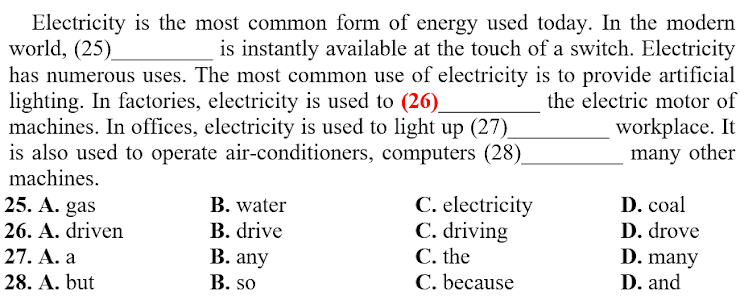Read the following passage and mark the letter A, B, C or D on your answer sheet to indicate the correct word or phrase that best fits each of the numbered blanks from 26 to 30.
School lunch
Research has shown that over half the children in Britain who take their own lunches to school do not eat (26) __________ in the middle of the day. In Britain, schools have to (27) ________ meals at lunchtime. Children can choose to bring their own food or have lunch at the school canteen.
One shocking finding of the research is that school meals are much healthier than lunches prepared by
parents. There are strict (28) _____________ for the preparation of school meals, which have to include one (29) ___________ of fruit and one of vegetables, as well as meat, a dairy item and starchy food like break or pasta. Lunchboxes examined by researchers contained sweet drinks, crisps and chocolate bars. Children consume twice as much sugar as they should at lunchtime.
The research will provide a better understanding (30) _____________ why the percentage of overweight in Britain has increased in the last decade. Unfortunately, the government can’t criticize parents, but it can remind them of the nutritional value of milk, fruit and vegetables. Small changes in their children’s diet can affect their future health. Children can easily develop bad eating habits at this age, and parents are the only ones who can prevent it.
Điền vào ô số 26
A. appropriately
B. properly
C. probably
D. possibly


Đáp án B.
Tạm dịch: Research has shown that over half the children in Britain who take their own lunches to school do not eat properly in the middle of the day: Nghiên cứu cho thấy hơn một nửa số trẻ em ở Anh mang bữa trưa đến trường không được ăn đúng cách vào giữa ngày.
A. appropriately: một cách thích hợp.
Ex: The goverment has been accused of not responding appropriately to the needs of the homeless: Chính phủ đã bị cáo buộc không đáp lại nhu cầu cho những người vô gia cư một cách thích hợp.
B. properly (adv): đúng quy cách, hợp lệ, đúng đắn.
Ex: When will those naughty children learn to behave properly? Khi nào thì mấy đứa trẻ hư đó học cách cư xử đúng đắn vậy?
C. probably: có lẽ.
Ex: It was probably his best performance: Có lẽ đó là màn trình diễn đẹp nhất của anh ta.
D. possibly: có khả năng, có thể.
Ex: Could you possibly turn the volume down?: Bạn có thể vặn nhỏ âm lượng không?